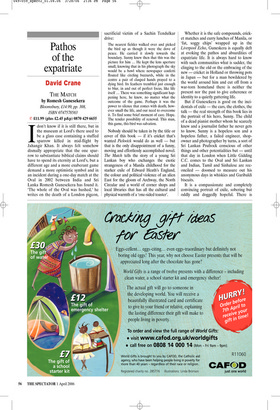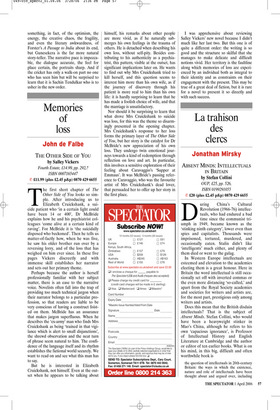Pathos of the expatriate
David Crane
THE MATCH by Romesh Gunesekera Bloomsbury, £14.99, pp. 308, ISBN 0747578583 ✆ £11.99 (plus £2.45 p&p) 0870 429 6655 Idon’t know if it is still there, but in the museum at Lord’s there used to be a glass case containing a stuffed sparrow killed in mid-flight by Jahangir Khan. It always felt somehow dismally appropriate that the one sparrow to substantiate biblical claims should have to spend its eternity at Lord’s, but a different age and a more exuberant game demand a more optimistic symbol and in an incident during a one-day match at the Oval in 2002 between India and Sri Lanka Romesh Gunesekera has found it. ‘The whole of the Oval was hushed,’ he writes on the death of a London pigeon, sacrificial victim of a Sachin Tendulkar drive:
The nearest fielder walked over and picked the bird up as though it were the dove of peace. He carried it slowly towards the boundary. Sunny knew then that this was the picture for him ... He kept the lens aperture small, knowing that in his photograph the sky would be a bowl where newspaper confetti floated like circling buzzards, while in the centre a pair of clasped hands prayed to a dying bird. Its feathers trembled just enough to blur, in and out of perfect focus, like life itself ... There was something significant happening here, he knew, no matter what the outcome of the game. Perhaps it was the power to silence that comes with death, however small the life, and our need to overcome it. To find some brief moment of care. Hope. The tender possibility of renewal. This man, this game, this bird was salvation.
Nobody should be taken in by the title or cover of this book — if it’s cricket that’s wanted Pickwick would do as well — but that is the only disappointment of a funny, moving and effortlessly accomplished novel. The Match tells the story of a young Sri Lankan boy who exchanges the exotic strangeness of a Manila childhood for the starker exile of Edward Heath’s England, the colour and political violence of an alien East for the gloom of Archway, the North Circular and a world of corner shops and local libraries that has all the cultural and physical warmth of a ‘one-sided toaster’. Whether it is the safe compounds, cricket matches and curry lunches of Manila, or ‘fat, soggy chips’ wrapped up in the Liverpool Echo, Guneskera is equally deft at evoking the pathos and absurdities of expatriate life. It is always hard to know with such communities what is sadder, the clinging to the old or the embracing of the new — cricket in Holland or throwing pots in Japan — but for a man bewildered by the world around him and cut off from a war-torn homeland there is neither the present nor the past to give coherence or identity to a quietly guttering life.
But if Gunesekera is good on the incidentals of exile — the cars, the clothes, the talk — the real strength of this book lies in the portrait of his hero, Sunny. The child of a dead pianist mother whom he scarcely knew and a journalist father he never gets to know, Sunny is a hopeless son and a hopeless father, a failed engineer, shopowner and photographer by turns, a sort of Sri Lankan Prufrock conscious of other things and other potentialities but — until that day in London when Little Gidding C.C. comes to the Oval and Sri Lankan and Indian, Tamil and Sinhalese are reconciled — doomed to measure out his anonymous days in whiskies and Garibaldi biscuits.
It is a compassionate and completely convincing portrait of exile, sobering but oddly and doggedly hopeful. There is something, in fact, of the optimism, the energy, the creative chaos, the fragility, and even the literary awkwardness, of Forster’s A Passage to India about its end, but Gunesekera is the far more natural story-teller. The narrative pace is impeccable, the dialogue accurate, the feel for place certain, the portraits sharp. And if the cricket has only a walk-on part no one who has seen him bat will be surprised to learn that it is Sachin Tendulkar who is to usher in the new order.



























































































 Previous page
Previous page